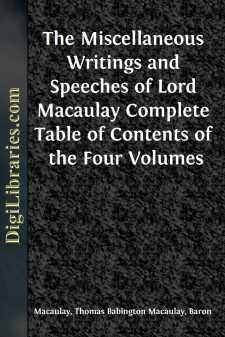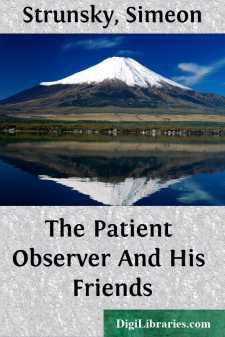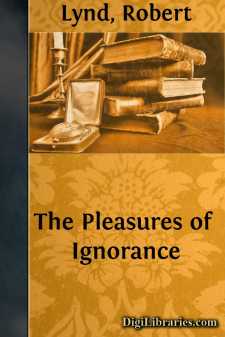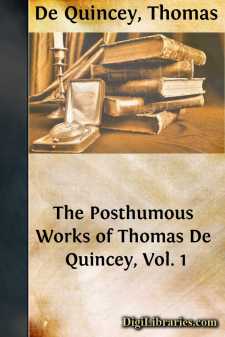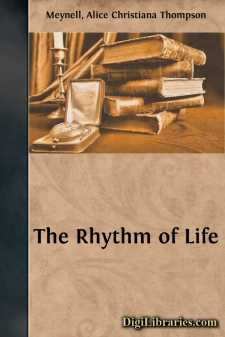Literary Collections
- American 84
- Ancient, Classical & Medieval 14
- Asian 1
- Australian & Oceanian 1
- Canadian 55
- Continental European 121
- English, Irish, Scottish, Welsh 179
- Essays
- General 24
- Letters 46
- Middle Eastern 1
Essays Books
Sort by:
CHAPTER I If I were asked what, in my opinion, distinguishes the thought of the present day from that of a previous generation, I should feel inclined to say, it is the fact that people are beginning to realize that Thought is a power in itself, one of the great forces of the Universe, and ultimately the greatest of forces, directing all the others. This idea seems to be, as the French say, "in the...
more...
Weep with me, all you that readThis little story;And know, for whom a tear you shed,Death's self is sorry. Ben Jonson. This story is no invention of mine. I could not invent anything half so lovely and pathetic as seems to me the incident which has come ready-made to my hand. Some of you, doubtless, have heard of James Speaight, the infant violinist, or Young Americus, as he was called. He was...
more...
PREFACE. Lord Macaulay always looked forward to a publication of his miscellaneous works, either by himself or by those who should represent him after his death. And latterly he expressly reserved, whenever the arrangements as to copyright made it necessary, the right of such publication. The collection which is now published comprehends some of the earliest and some of the latest works which he...
more...
by:
Simeon Strunsky
COWARDS It was Harrington who brought forward the topic that men take up in their most cheerful moments. I mean, of course, the subject of death. Harrington quoted a great scientist as saying that death is the one great fear that, consciously or not, always hovers over us. But the five men who were at table with Harrington that night immediately and sharply disagreed with him. Harding was the first to...
more...
by:
Ralph Bergengren
THE PERFECT GENTLEMAN Somewhere in the back of every man's mind there dwells a strange wistful desire to be thought a Perfect Gentleman. And this is much to his credit, for the Perfect Gentleman, as thus wistfully contemplated, is a high ideal of human behavior, although, in the narrower but honest admiration of many, he is also a Perfect Ass. Thus, indeed, he comes down the centuries—a sort of...
more...
by:
Robert Lynd
I THE PLEASURES OF IGNORANCE It is impossible to take a walk in the country with an average townsman—especially, perhaps, in April or May—without being amazed at the vast continent of his ignorance. It is impossible to take a walk in the country oneself without being amazed at the vast continent of one's own ignorance. Thousands of men and women live and die without knowing the difference...
more...
GENERAL INTRODUCTION. These articles recovered from the MSS. of De Quincey will, the Editor believes, be found of substantive value. In some cases they throw fresh light on his opinions and ways of thinking; in other cases they deal with topics which are not touched at all in his collected works: and certainly, when read alongside the writings with which the public is already familiar, will give...
more...
INTRODUCTION. All that needs to be said in the way of introduction to this volume will best take the form of notes on the articles which it contains. I. 'Conversation and S. T. Coleridge.' This article, which was found in a tolerably complete condition, may be regarded as an attempt to deal with the subject in a more critical and searching, and at the same time more sympathetic and inclusive...
more...
by:
Jonathan Swift
INTRODUCTION Swift has been styled the Prince of Journalists. Like most titles whose aim is to express in modern words the character and achievements of a man of a past age, this phrase is not of the happiest. Applied to so extraordinary a man as Jonathan Swift, it is both misleading and inadequate. At best it embodies but a half-truth. It belongs to that class of phrases which, in emphasizing a...
more...
THE RHYTHM OF LIFE If life is not always poetical, it is at least metrical. Periodicity rules over the mental experience of man, according to the path of the orbit of his thoughts. Distances are not gauged, ellipses not measured, velocities not ascertained, times not known. Nevertheless, the recurrence is sure. What the mind suffered last week, or last year, it does not suffer now; but it will...
more...




